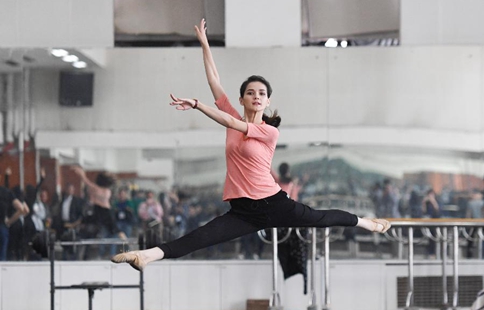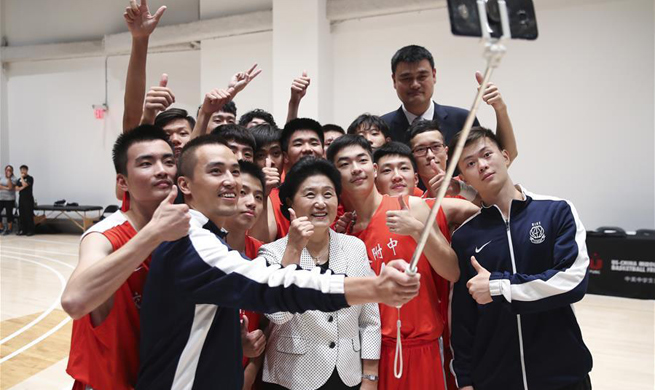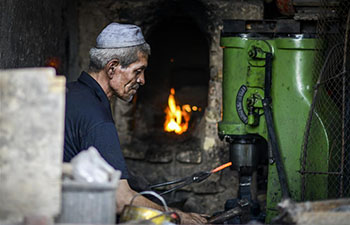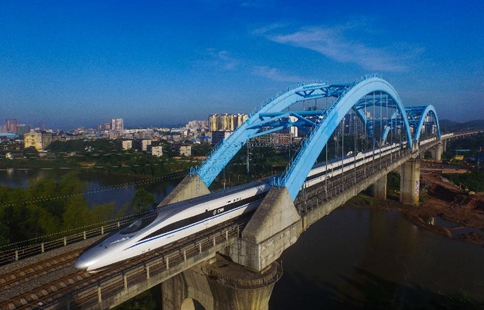VANCOUVER, Sept. 27 (Xinhua) -- At first glance, it appears that the 30th International Conference on Intelligent Robotics and Systems has no difference from any other business conferences, but taking a closer look makes people feel like they are from a science fiction movie.
At one kiosk, the German company Kuka, together with researchers from the University of Alberta, are coaching a visitor to sign his name onto a tablet screen with a pen.
A large multi-jointed robotic arm nearby springs into action, grasping a felt pen and inking the identical image onto a pumpkin that's set on a table.
At the station of Robotics, a small 12-inch-tall humanoid robot called OP3 poses for a photographer and then turns and kicks a small soccer ball across the trade-show floor. The small research robot can apparently see and distinguish colors, shapes and faces, and it also can speak, move around on its two legs and even learn.
Apart from demonstrations, this year's robotics conference also includes robotic competitions, seminars and social events. It groups some 3,000 paying attendees, said Zhang Hong, the event chair and a professor of computing science at University of Alberta, in Edmonton.
Many of bright minds in robotics are gathered here to share their new ideas from Sunday to Thursday. About 54 companies showcase their latest robotic technology at the Vancouver Convention Center.
Over the last few years, the robotics industry has moved beyond the auto manufacturing plants and university laboratories into a broader commercial space, Zhang said.
"Companies like Apple for example, and Amazon, Google, Toyota - they're all part of this movement now," he told Xinhua. "Now we are seeing the user group growing."
One of the companies who has been wise to the transition is HEBI Robotics from Pittsburgh. The company has created a robot kit. It's meant to be simple to construct, adjust or expand for companies that have their own needs, said Dave Rollinson, the company's co-founder.
HEBI is demonstrating a version here that looks like the robot from the 1986 movie Short Circuit. It rolls on wheels, has two arms and a head-like attachment.
A young man guides the robot with a PlayStation 4 controller. It shrinks down, then moves back and forth, before it picks up a small wooden box from a table, spins it in its grasp and sets it back down.
"You're looking at a demonstration platform that we put together in three weeks," Rollinson explained. "It's a robot we call Igor. The idea is that we built this robot extremely quickly because he had the right building blocks."
They've perfected a system of joints or actuators that can be used as the so-called building blocks for various robotic shapes or designs. The goal is to fast-track the robotic design process for third-party companies who need a robot for a specific job or task.
"We want to make building a physical robot to be as easy as building with Lego," Rollinson said. "That can take many, many forms. We think we need to be at the modular level because we need to get out beyond just a robot built onto a table. We need to be out in the real world. We need to have different form factors."
Their modular system has a patented rubber and spring joint system that mimics a human's limbs. He said it is ideal for human tasks such as pressing, torquing and handling objects.
Zhang said most of the progress in robotics has been in automation of factory work and warehousing systems, but now its progress has expanded to other fields.
Robots can work at home and in hospitals, he said, noting that image understanding, speech recognition, and improved dexterity in robots are progressing to the point where many more commercial uses may just be around the corner.
Zhang said that there's a question he gets all the time: how is artificial intelligence (AI) influencing robotics?
AI and robotics seem to be progressing in parallel but non-connected tracks, he said. "If you look at the people that attend AI conferences and the people who attend robotics conferences; they are two groups of people."
"The two need to integrate," he said. "There are definitely a lot of ideas in AI that could benefit robotics, and vice versa."
The International Conference on Intelligent Robotics and Systems is an event that rotates each year in Asia, Europe and North America. This year, Vancouver, a burgeoning tech hub, beat out Atlanta to hold the event.
















